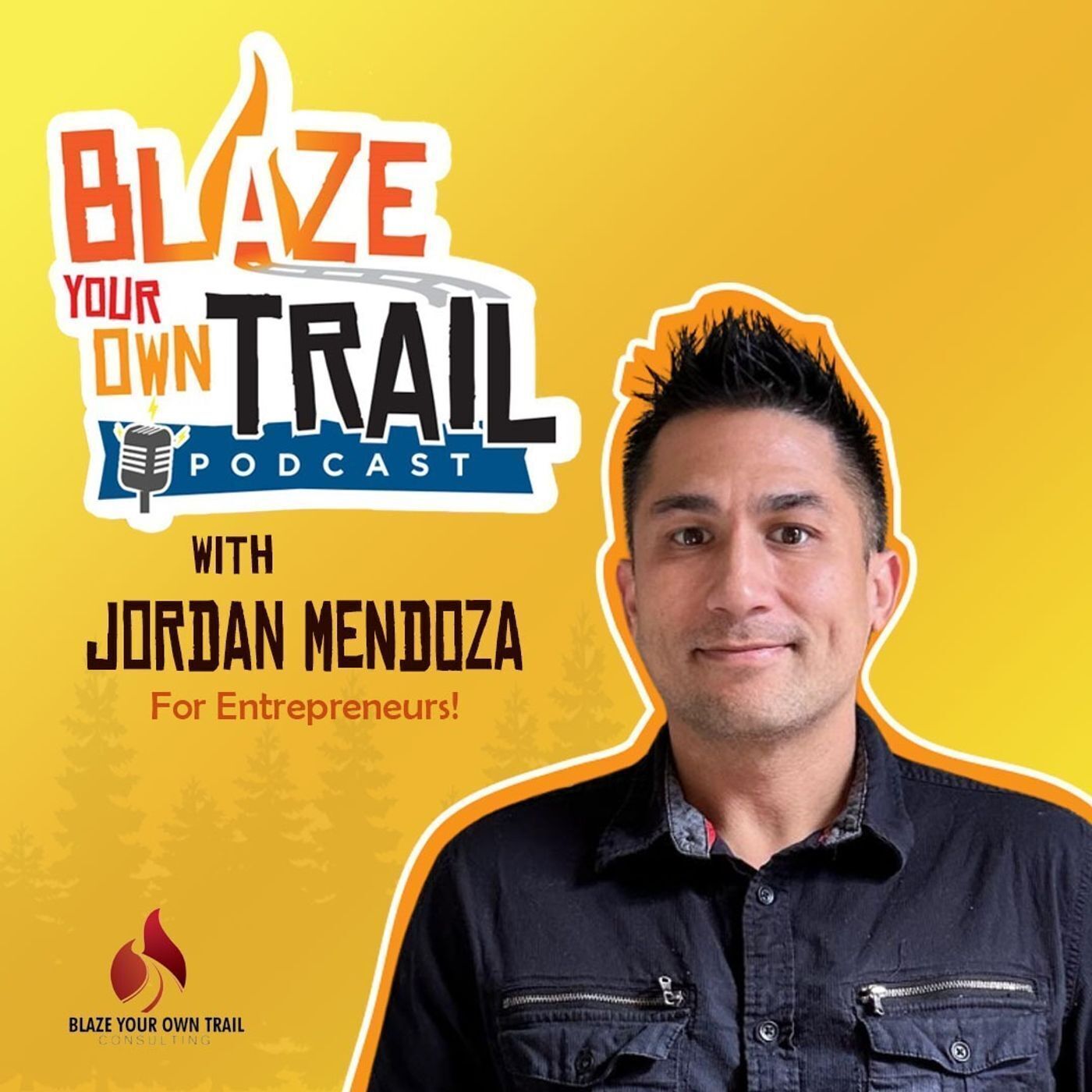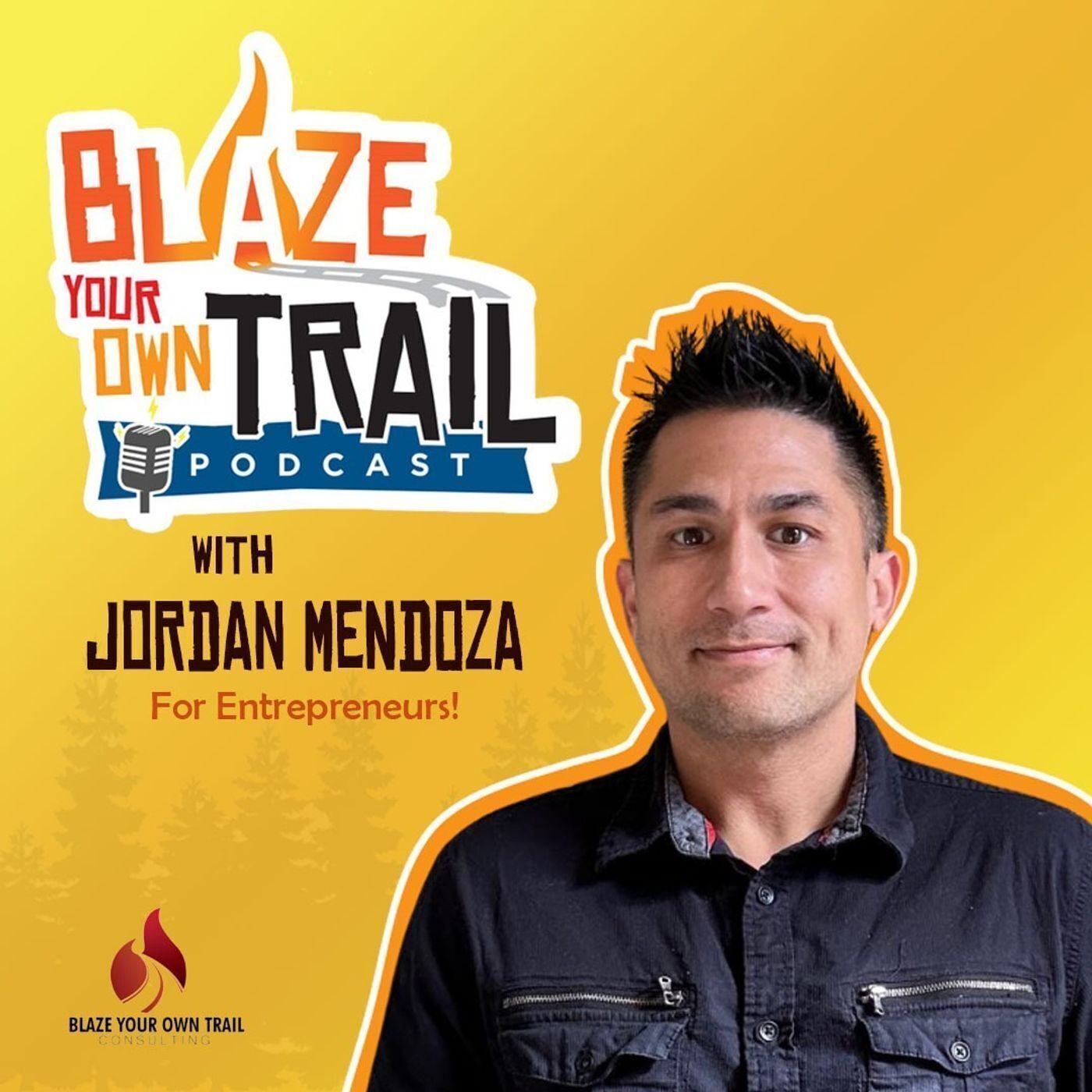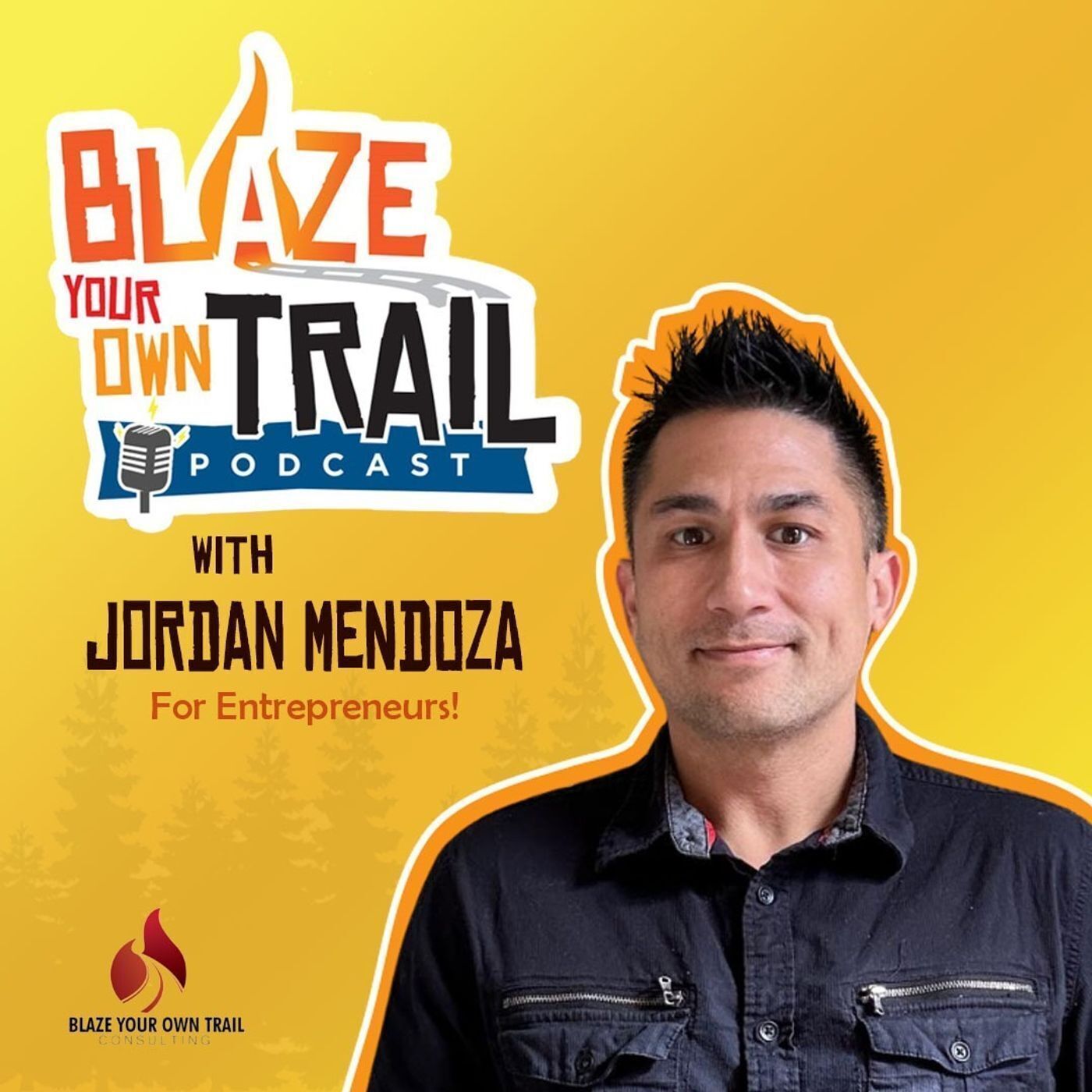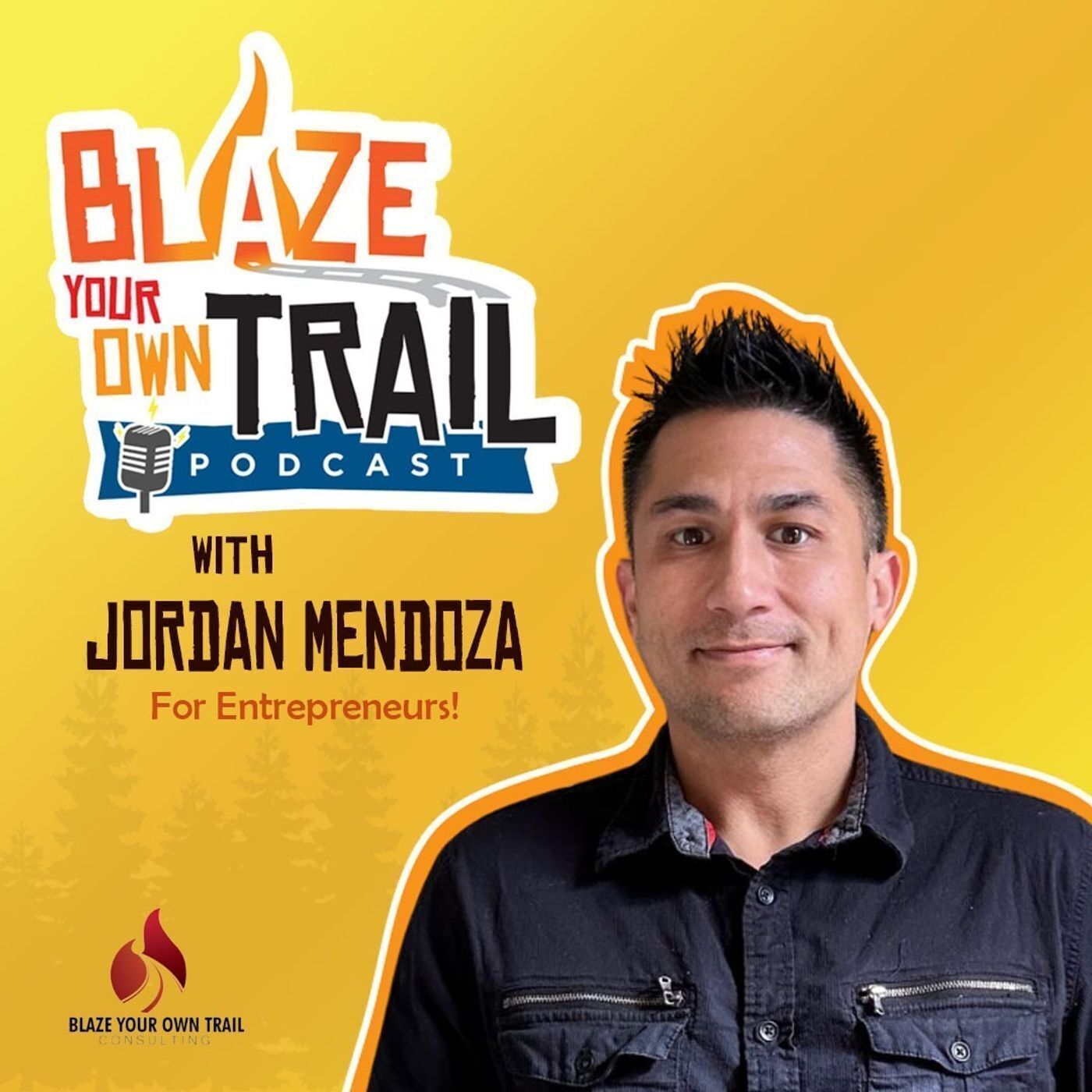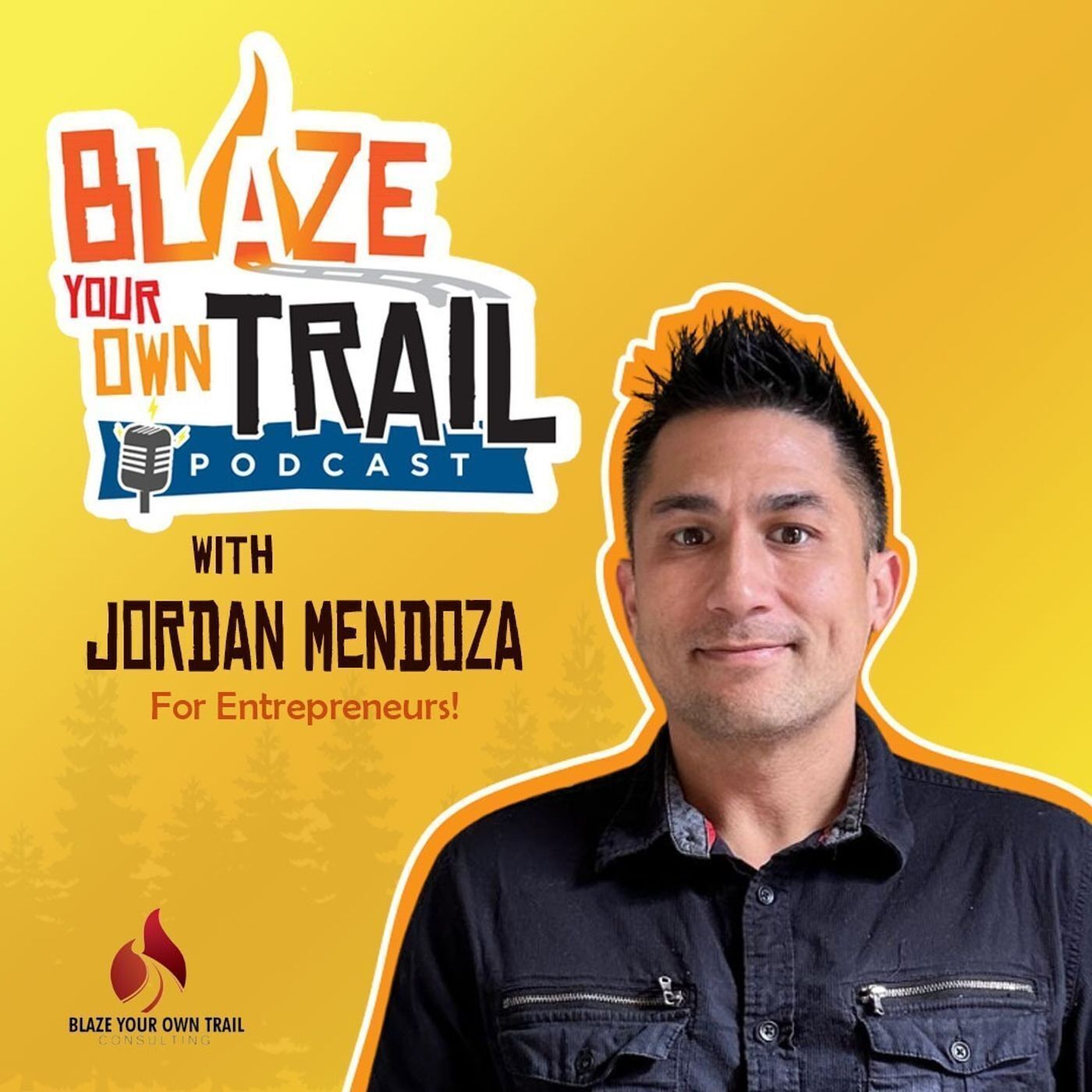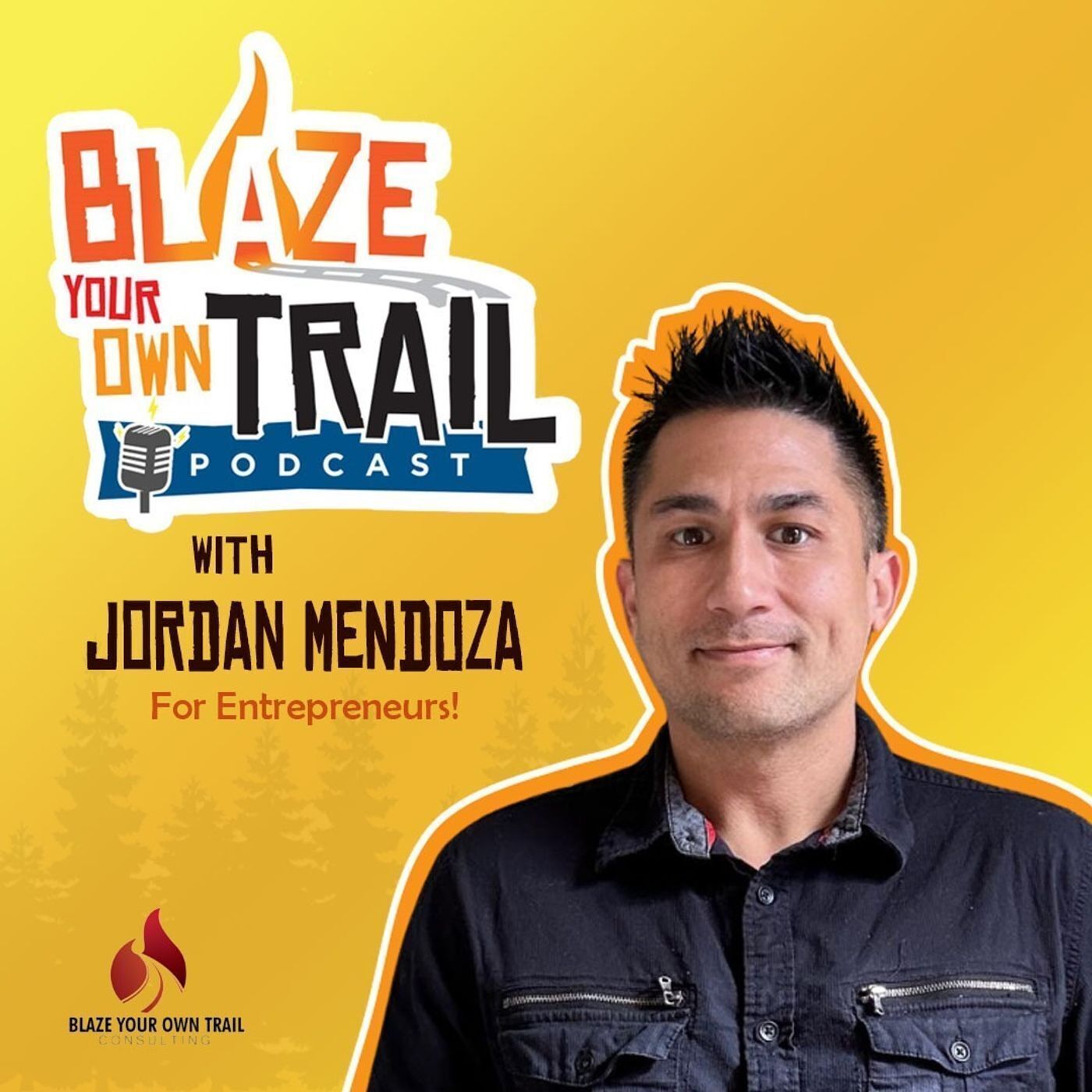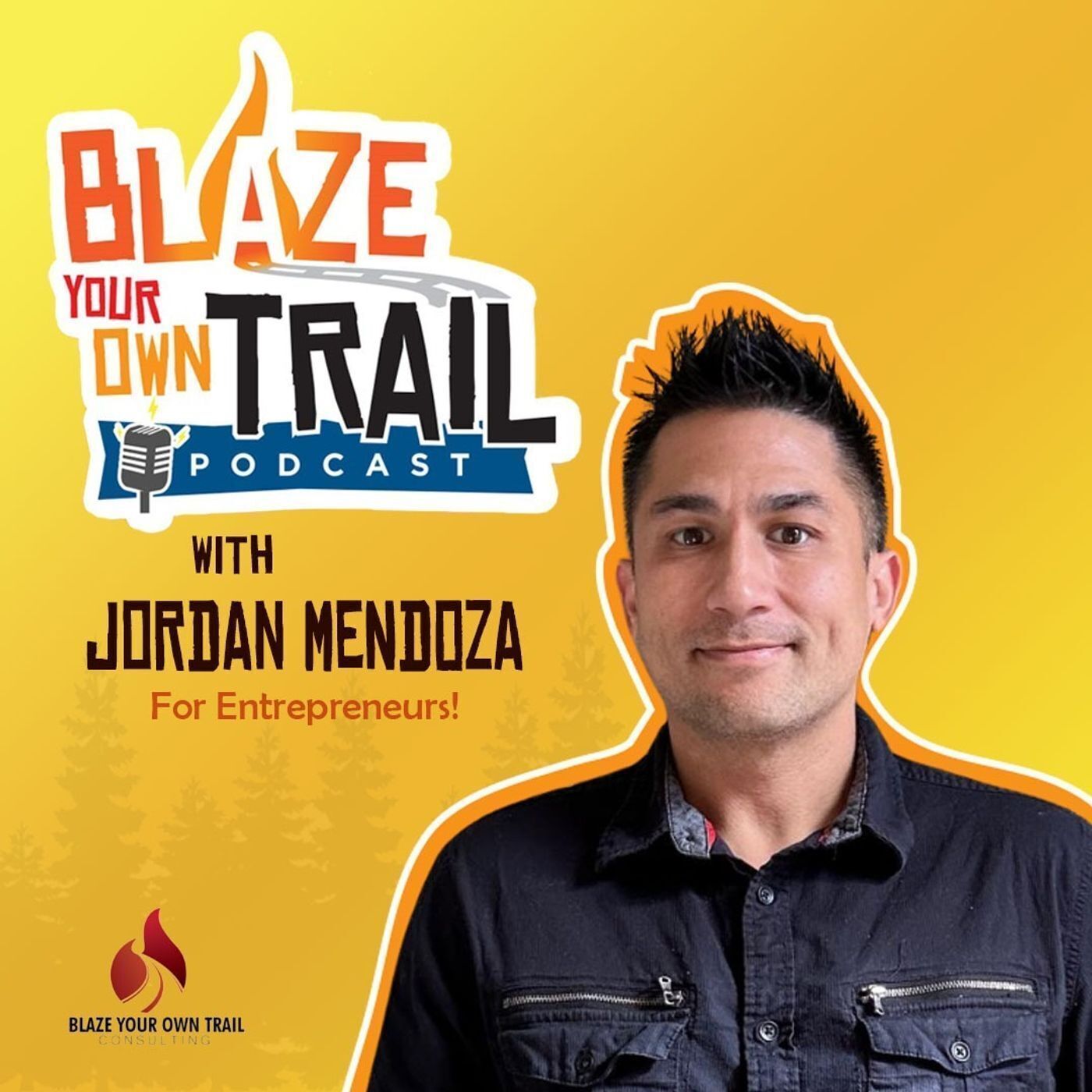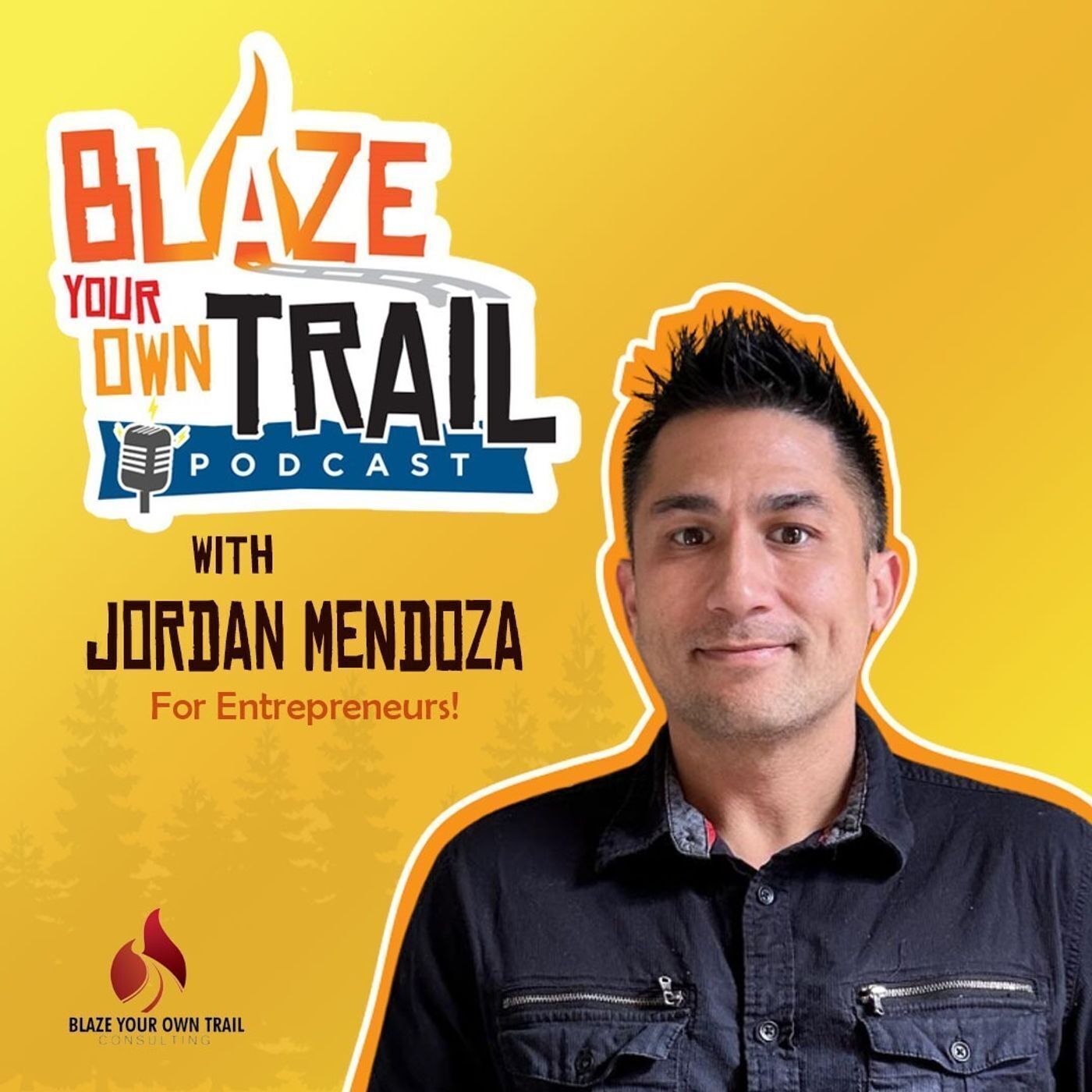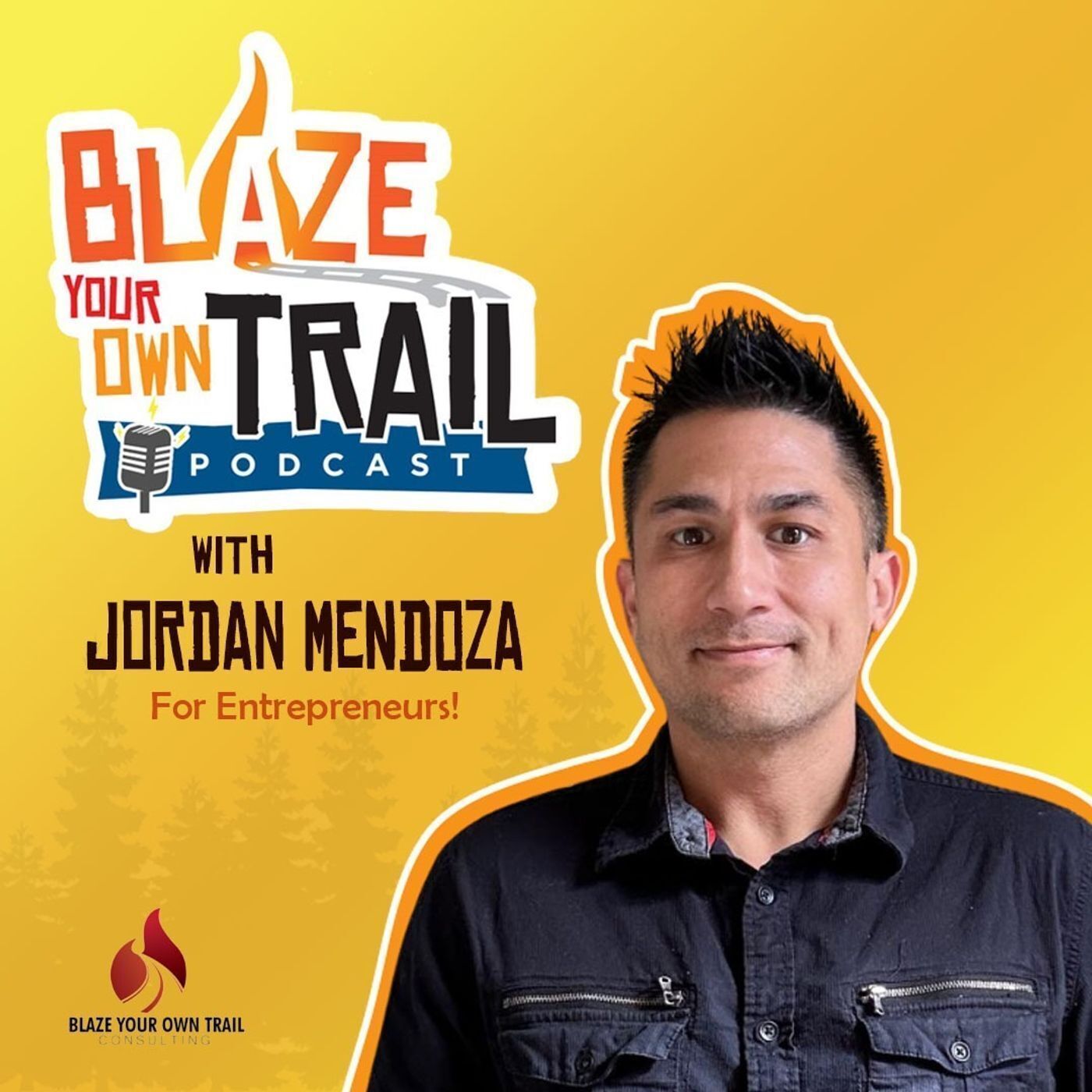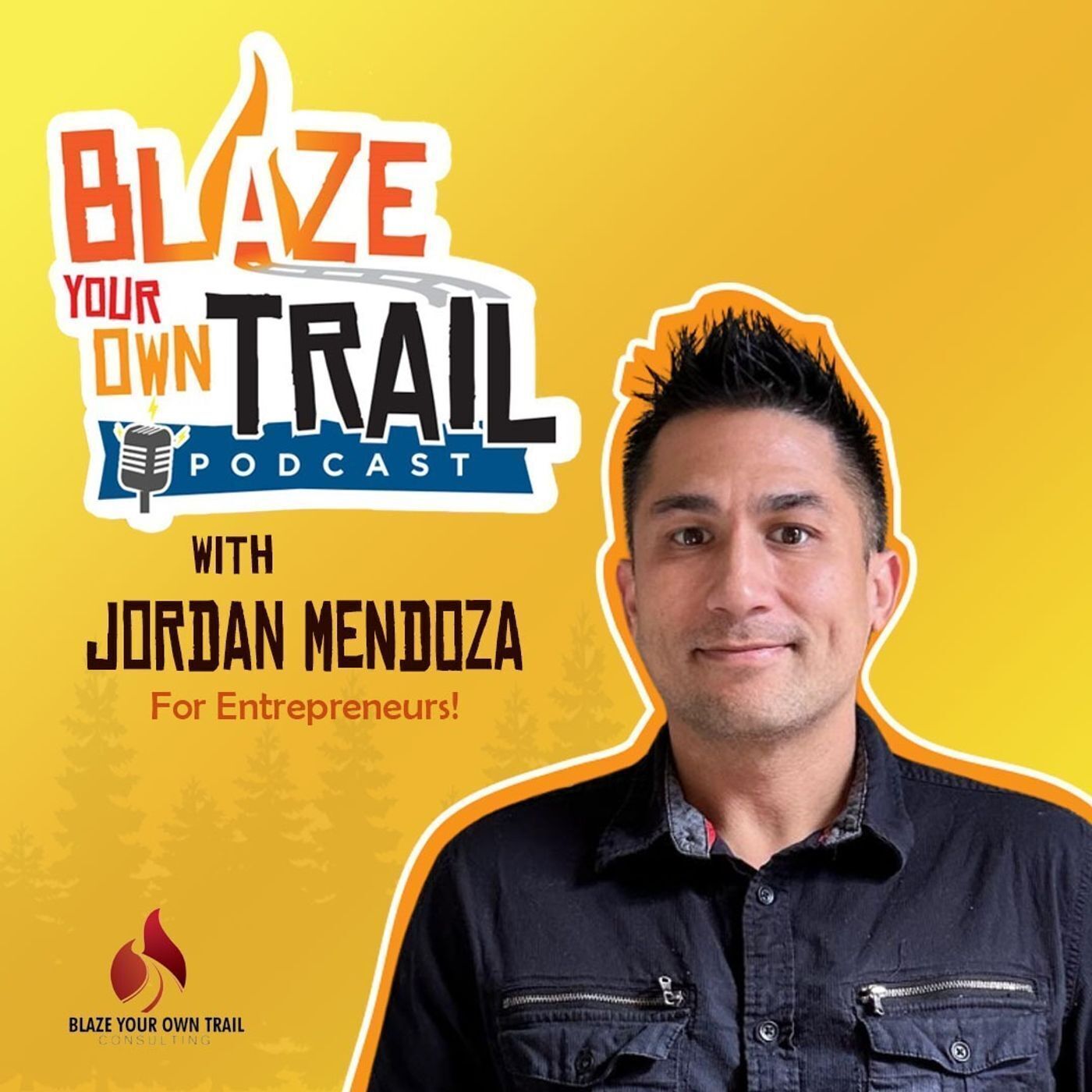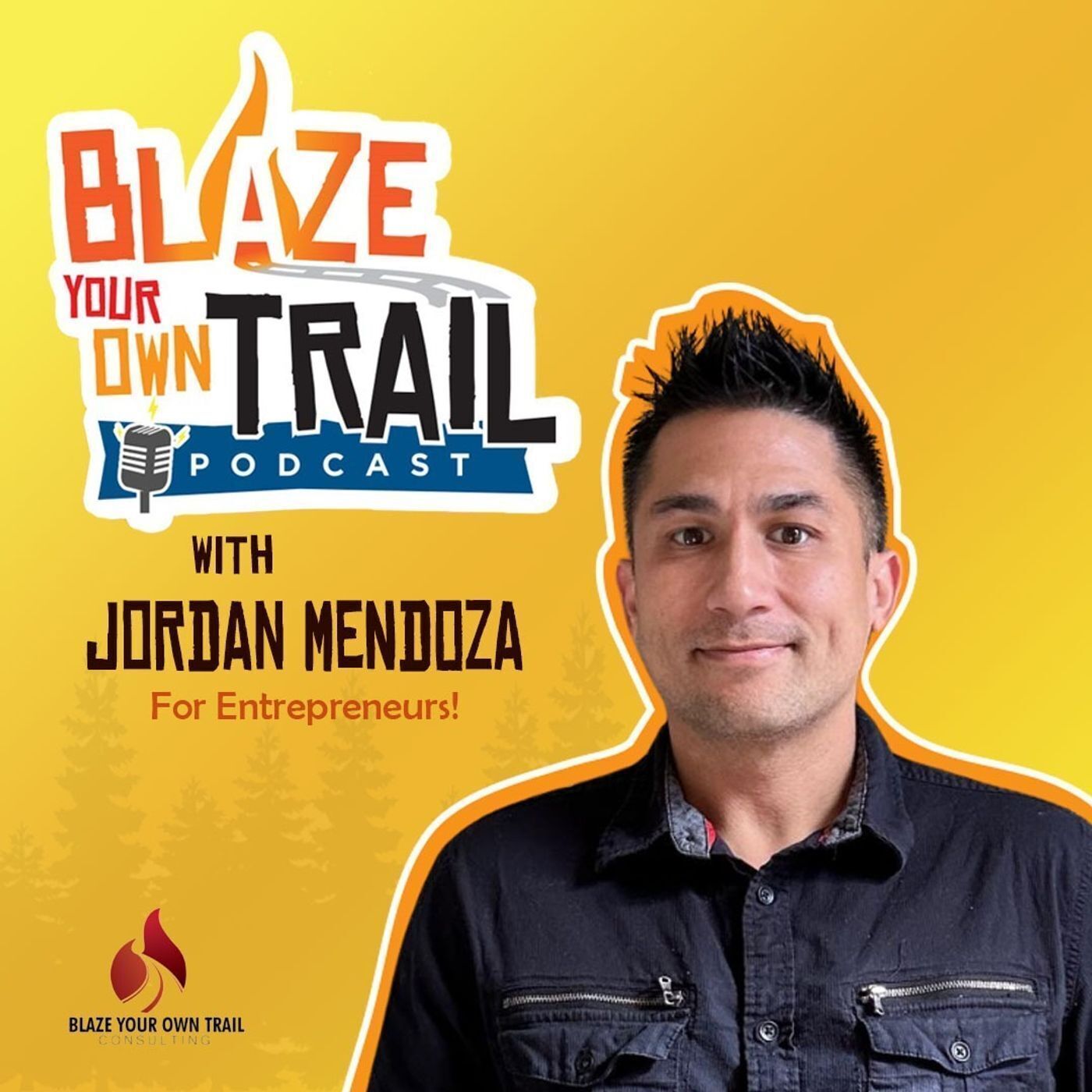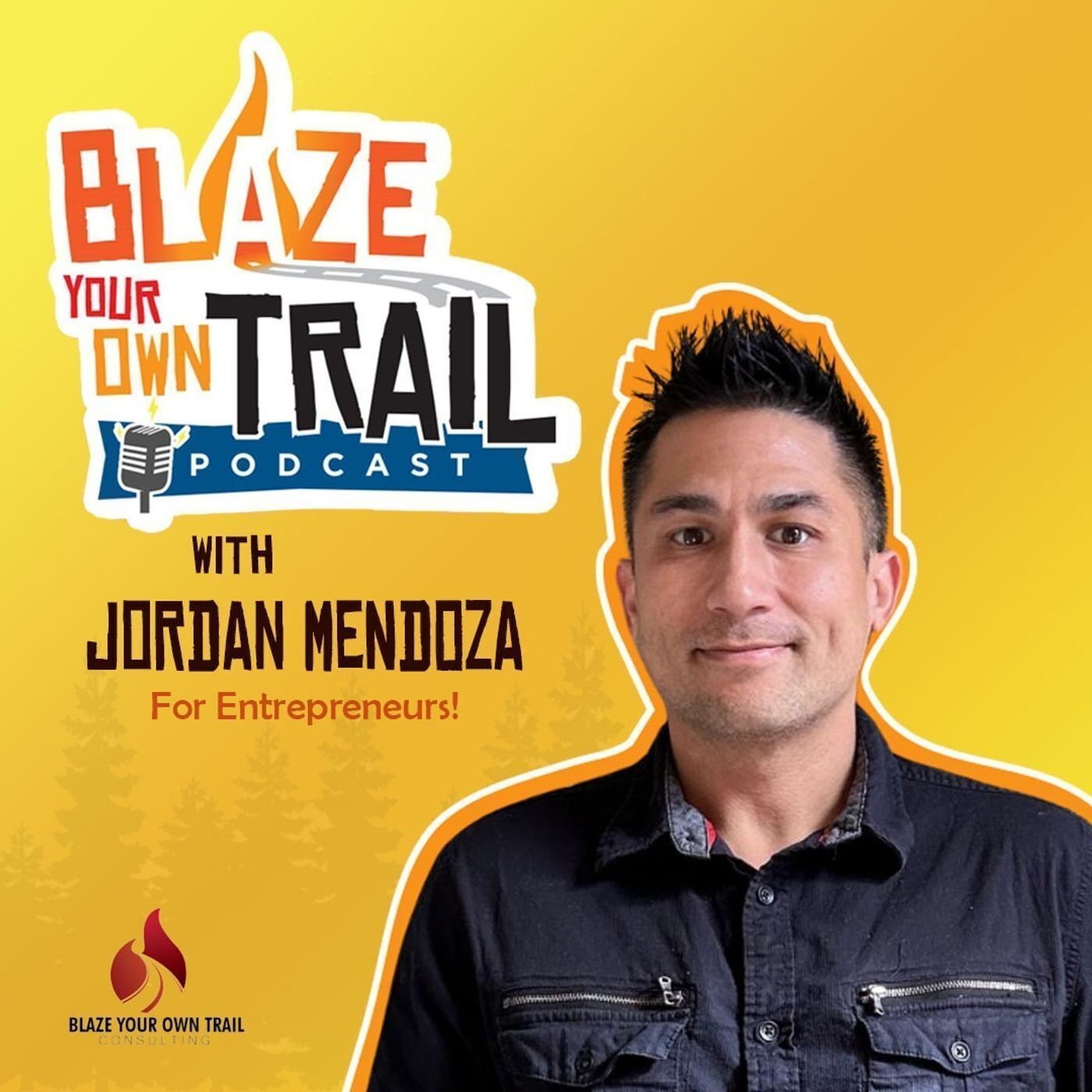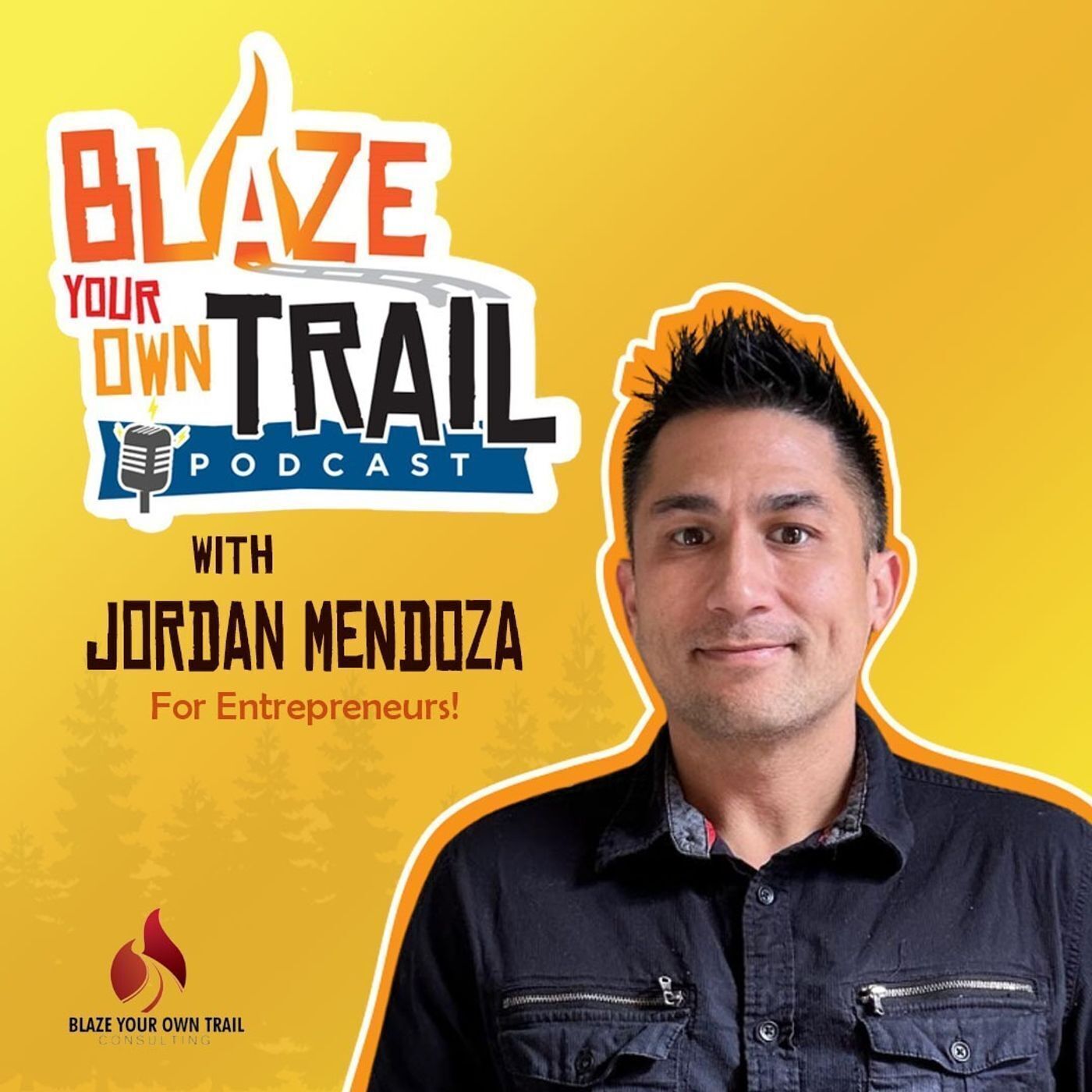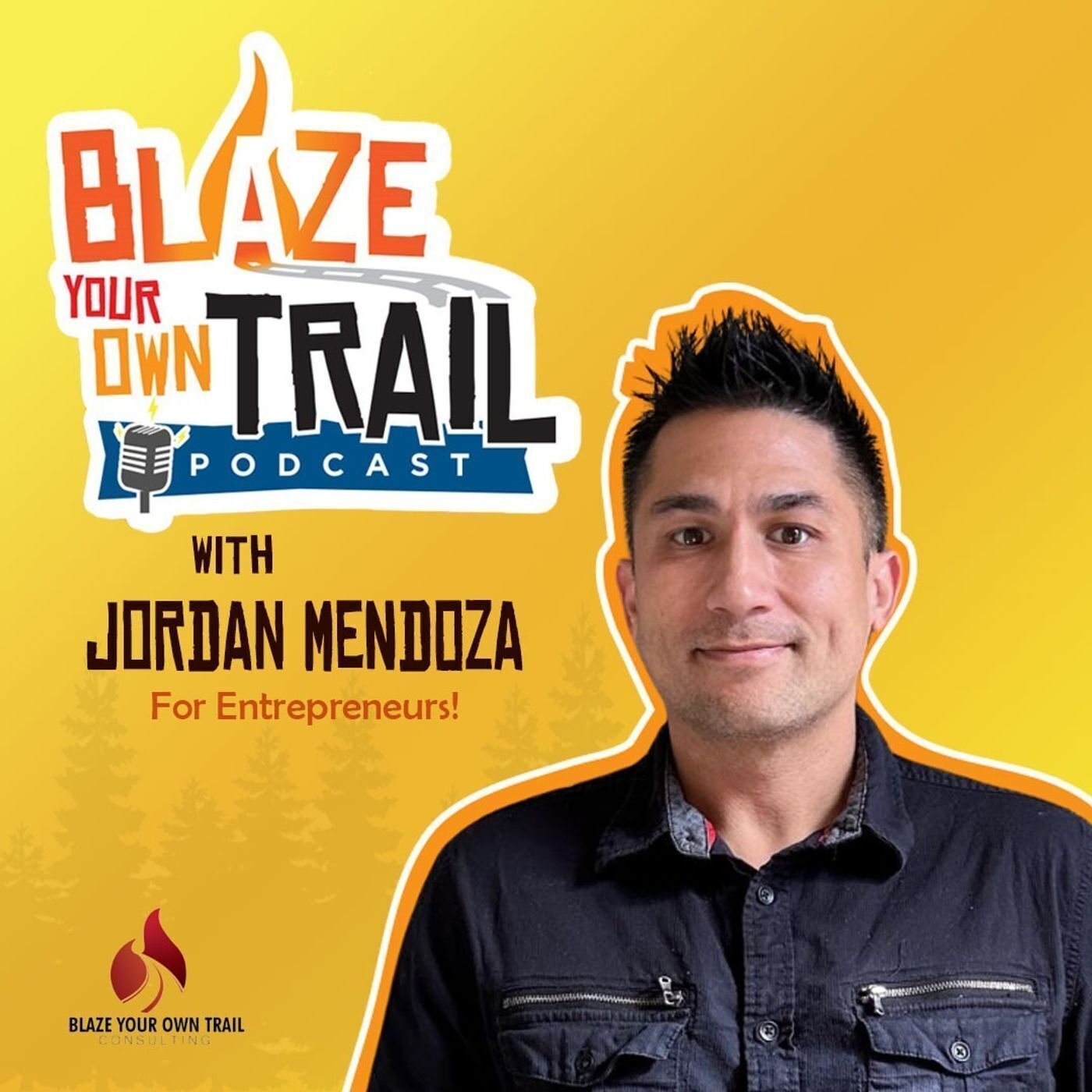Transcript
Jordan Mendoza (00:02.177)Hello everyone and welcome to the blaze your own trail podcast. My name is Jordan Mendoza. I'm your host and I've got a very special guest today. His name is Austin Armstrong and I'm going to have him tell you a little bit about who he is and what he does today.Austin Armstrong (00:18.168)Thank you so much for having me on brother. It's an honor and a privilege.I am a social media marketer at heart. I've been doing this for 20 years, grinding, staying consistent, which has allowed me to build the life of my dreams. I started my first company about six and a half, seven years ago, which is a social media and SEO marketing agency. The last three years I've been hyper-focused on being an AI SaaS founder for a company called Syllabi, which lets you create, schedule, publish,videos to social media. also an international speaker and I have a couple million followers across social media and I love what I do.Jordan Mendoza (01:02.633)Love it, love it. Appreciate that context. And I know just in hearing that our audience is gonna be excited to learn more about you and your story. And honestly, Austin, my favorite part of this show is actually taking a rewind and getting deep context into our guest's story and their journey, right? Because you got a lot of success today, which is amazing. And we're gonna get into that towards the end of the episode. I want people wanna know what you're made of. Like, what did it take for you to get here? So...If you can share with the audience, where were you born and raised and what kind of kid were you? What type of things did you get into? Were you more into academics? Were you into sports? Give us some context on the younger version of Austin.Austin Armstrong (01:43.606)Yeah, absolutely. So I was born in Lancaster, Pennsylvania for the first10 years of my life and then I moved to Point Pleasant, New Jersey where I lived from 10 to 23. I was a terrible student. School was not really my path. I barely made it through high school. Don't have a college degree. I went kind of the internship to entrepreneur route, if you will. But as a kid, I always very extroverted as well. I've talked to my mom about this and I've alwaysin a, an assertive extroverted person. earliest memories would be, I would, we'd be out at, a pizza hut or something like a restaurant. And I would leave our family table and go to another table to talk with people, just to get to know them. and I've always had that personality trait. I will always speak my mind. I will always be assertive. And I think that that's really helpedme in the conference scene and being a content creator and being a entrepreneur as well. I stumbled into, I did play a lot of sports so I was definitely an athletic kid. I'm still pretty athletic. I grew up in a baseball family. My great uncle's in the baseball hall of fame, Bruce Souter, who retired in Atlanta. Actually we were just talking the year in Atlanta.He's got a glove in the legacy section there, which is really cool if you have a chance to go to Rave Stadium sometime.Jordan Mendoza (03:25.441)Very cool.Austin Armstrong (03:27.15)But yeah, played a lot of baseball growing up, played a lot of basketball growing up. And then I got into Muay Thai when I was about 19 years old. And I've trained for about 16 years, which is kind of crazy to think about. But yeah, I got into social media marketing super early, about 14 years old on MySpace, got bit by that bug. And I've been doing it pretty much ever since.Jordan Mendoza (03:42.561)That's great. Awesome.Jordan Mendoza (03:54.445)Yeah, that's, that's awesome. It's funny because I started in the MySpace arena as well. I think that was back in 2004, 2005. And, and I remember, you know, sharing music and then, you know, kind of trying to build this. It was an audience. We didn't call it building audiences back then, but then Facebook came out and started, you know, started to build that. So, so definitely want to get into, you know, the early days of building social and inAustin Armstrong (04:01.112)yeah.Jordan Mendoza (04:22.477)just like me, I'm sure you had zero idea what this would be in the future and how prevalent it would be in the marketplace. But, um, so let's talk quickly about sports. So I was a big baseball guy. I played baseball for 12 years, soccer for 12 years. Uh, was terrible at both. was really great at fundraising. I loved going and selling the beef jerky and the candy bars was actually my favorite part of playing both sports, but played, still enjoy basketball. So what are some lessons, you know, being coming from a sports family thatAustin Armstrong (04:40.036)Bye.Jordan Mendoza (04:51.723)you can extract from your time in playing sports, and it could maybe be the Muay Thai that you've now started, what are some lessons you can extract that relate directly to business?Austin Armstrong (05:04.366)That's a great question.My mind goes in a couple different directions. So I am very much an ADHD entrepreneur as well, diagnosed with ADHD. And sports has always allowed me to hyper focus on something for a period of time, whatever that is, a training session, a game, whatever you're doing. And so that is not directly a business lesson, but helping you find that outlet.of something that you can hyper focus on for a set period of time.Because when I'm working my brain is all over the place. I've got a 10,000 tabs open I've got my phone on on my side and I'll do a task for five minutes and I'll switch over to something else and then I'll do a phone break and I'll my scattered brain is just crazy, but If you can find something that allows you to hyper focus That that is a skill that you can figure out ways to bring into your businessThe consistency and grind of a lot of it as well. mean, like social media marketing and growing an audience is like a video game and so is martial arts. You go in and you get your ass kicked at the beginning. I don't know if I'm allowed to swear on this, but you can blur it out or whatever.Austin Armstrong (06:34.87)You get your ass kicked and you continue to go back and show up and get those reps in and make little micro improvements. And before you know it, the consistency and the muscle is there. And so I've really taken a lot of those lessons from showing up every day and Muay Thai, showing up at baseball practice in how I create content, just showing up, creating a video every single day, creating multiple social media posts every day, studying and testing what works and what doesn't work.Same thing in Muay Thai, let me try this combo on a couple different people a couple different times. Does this work? Does it not work? Let me try something else. Same thing with social and business as well. Test a theory out, test it a couple times, validate the idea. If it doesn't work, move on, try a new combo, try something new. Those are consistency over time as well. Like no pro athletes got there by sheergenetics like and same thing with social media like it'll carry a long way like maybe you're a very attractive person and anything you post on social will do pretty well but it doesn't necessarily mean that it's gonna translate to business you have to stay consistent through everything that you do so I think above all else like martial arts taught me just consistency over time leads to successJordan Mendoza (07:49.069)100%.Jordan Mendoza (07:59.809)That's it. Yeah. And I tell my clients all the time, it's about the reps. know, you got to put in the reps. You can't just show up Monday and then be like, I don't want to do it Tuesday. You know, like you do that and you're basically dead in the water. You know, you have to get up no matter how bad it looks. But I love the fact that you said you have to test and that's something else too. If you're not testing, if you're not iterating, if you're not, you know, seeing what one thing is going to do versus another, then you're also shooting yourself on the foot because you're basically.Austin Armstrong (08:03.714)Mm-hmm.Austin Armstrong (08:09.119)ThankAustin Armstrong (08:17.838)Mm-hmm.Jordan Mendoza (08:28.353)just doing things that don't work consistently. And we all know what that leads to eventually. So let's talk a little bit about the early days because when it's 2025 at the time we're recording this episode and you've said that you've been in doing this for 20 years. So if people rewind when we were talking 2005, maybe even 2004, social media looked a lot different back then. The platforms, the user interface, you know, theway to monetize the algorithms. So can you talk a little bit about what it was like for you starting out building an audience on a platform like MySpace and then the nuances and differences or maybe if you would have known back then what you know now, how you think it would have been a little different.Austin Armstrong (09:15.904)Yeah, I love talking about this stuff because first of all, I just get nostalgic about those MySpace days for me because there was such a young person that my brain was still developing. But there's so many...similarities between what was happening 20 years ago and today. That it kind of blows my mind. how, I'm gonna go all the way back 20 years. How I first started to grow was just sending connection requests to people. I don't know really why I was so interested in that. Like I saw other people that had large followings and I wanted that validation for some reason.again, well, like where did that come from? Because social media marketing and growing a following like was such an infancy. I don't even know where that came from, but I knew that I wanted it. And so I started to connect with people and there were no algorithms back there back then. So if anyone remembers Facebook, there wasn't a feed. There was like a message board area. And so when you posted something in that message board, there was all of the posts were in this centralarea that was separate from your actual profiles and that's where all of the growth really happened. So I started to follow a bunch of people and I did this until I got a couple thousand connections or a couple thousand followers on there. And then I started to find these and get invited into these communities of other people that were doing the same thing or that had a little extra success. And what we started to do was collaborating. It wasn't called collaboratingright there. I didn't make this term up. It was called whore for whore, W for W. I didn't make that term up. That's what it was called back in the day. You're whore for whore, share for share. I'm sharing your profile, you're sharing my profile. Not politically correct. That's just what it was called.Austin Armstrong (11:19.406)And we did this through AIM, AOL Instant Messenger chats and group chats. So AIM had the ability to create a big group chat and you can invite everybody's AIM handles in there. And so that's how we really grew. I had hundreds of thousands of followers on MySpace back in the day. so we would, every day we would go into these groups on AIM and one by one,we would share our HTML code for everybody else in there to share to their profiles, telling everybody to follow that person, to follow me. It was my turn. And then we always had to share proof. So you take a screenshot and show proof that you shared, right? And then it's your turn and then you do it. And we would do that for hours.But we were able to monetize it in a lot of different ways as well, which is one of the other things that I really took with me is that I was doing, I was promoting local bands and t-shirt companies. They paid me to post about them because there was no algorithms. Like basically all of your followers, everybody saw everything. So the reach was amazing.And we did I I did email lead generation, which is a little sketchy but these early email marketers would be like every email that you get to opt in I'll pay you two dollars and Because we had hundreds of thousands of followers We were getting so much money and who know they were like selling all kinds of weird crap to email marketing back when open rates were like 60 70 percent like really high open rates So it was just it was just a win-win solution across the boardThe other thing that we did is I had a reallyAustin Armstrong (13:09.966)brilliant friend in high school that was a website developer and programmer. And so we developed an early SAS platform when I was 15, 16 years old that basically automated what we were doing in those AIM group chats. So there was this sort of, they were called trains where a lot of people would enter their code to be in this big list of profiles that you could follow.in that message board area. And so we built a software where you could add yourself on there for free or pay to be listed at the top of that. And it had this crazy virality effect because everybody wanted to grow their following. kept everybody posted it out and it linked back to the website. So it had this insane flywheel effect and like I didn't come back to SAS until threeyears ago. Like that was one of the biggest things like why didn't I keep doing sass like whoa. And the last lesson that I learned from there is that it's rented territory as well. And so before we pressed record we were kind of chatting about TikTok ban in my account. Well on Myspace there was a day where they literally deleted all of our profiles.So we had grown to hundreds of thousands of followers and they deleted like a hundred of us, just wiped us off, saw us as spam for what we were doing, didn't like it. No notice, we all just woke up and didn't have a profile anymore. And that was the end of the world for me.at the time, but I've since gotten used to it. Social media is rented territory. It's so important to pull them over to your website, to your CRMs, to your email list, places that you actually own the data and the information. So that's a long-winded rant, but those are some of the questions.Jordan Mendoza (15:09.901)Yeah, no, that's some great context for A, for people that are going to listen to this that didn't have an opportunity to create or build audiences there. This gives a behind the scenes on how you were able to not only build them, but accelerate the timeline and monetize. mean, was almost like it was a early version of Discord, know, something like that that you've kind of replicated plus Zapier, which didn't exist yet. Right. So you kind of had all these different tools that areAustin Armstrong (15:32.482)Mm-hmm.Jordan Mendoza (15:39.829)now very prevalent in the business world, but you can go back 20 years and you are already building some semblances of them. So that's really, really cool to be able to take a, take a peek back at. Awesome. So let's talk a little bit about, let's go into this conversation a little more about owning your audience because you know, we were chatting a little bit before we hit record and both of us have had experiences of losing audiences. You you spendyou put in work and effort and you mentioned the reps and what it takes to, be able to build. even when you figure it out, it still takes time and energy and effort. And when it just goes away overnight, it's super frustrating. And if anyone's listening to this and you've never woken up to a deactivated account or a band account or anything like that, then you don't know what we're talking about, but it's not a great, it's not a great feeling. mean, you, you literally said that your whole world ended whenthe MySpace thing went away. And so let's talk a little bit about where did you go next? Okay. A and you know, what would your advice be to people that might have all their eggs in the social media baskets per se and have not started to own their audience by creating offers and building lists and things like that.Austin Armstrong (16:58.252)You have to diversify. This is going to sound really blunt, but you're pretty stupid if you go all in on one thing. I have some friends that, most of them have diversified. fast forward a couple of years, I'll backtrack.I really started to grow my audience again on TikTok and I met a lot of amazing TikTok coaches, TikTok business owners, TikTok agency owners, and most of the smart ones have diversified into short form video and other aspects of content creation. But there's a couple of people, I'm not going to name names, but they are all in on TikTok. It's all that they do and they don't even touch any otherplatforms and if if TikTok gets banned their entire businessgets wiped off the face of the earth instantly. And that is so stupid. Like you don't have to spend all of your time on these other platforms, but please, I beg you to diversify because if you're only, and it doesn't matter if it's just your business or your lead source, your biggest lead source, like if that gets wiped out, if the platform shuts down, if your profile gets shut down,That's your biggest revenue source for the entire purpose of your business. What are you going to do? You know, what are you going to do for your family? How are you going to pay your bills? How are you going to feed your children? Everybody that you have that depends on you. So don't do that. I'm trying to do it. I lost my track there. so.Austin Armstrong (18:53.452)Can you ask a question? Diversify.Jordan Mendoza (18:56.501)Yeah, yeah, so I saying why is it important to diversify so that you can own your audience?Austin Armstrong (19:03.03)Yeah, so yeah.Because it'll yeah, you these are rented territories. I'll just kind of wrap with that that like it's so important to grow across all of these platforms because you don't know if they're going to shadow ban you impact your reach, the platform might get shut down. And it just expands your overall opportunity to develop multiple streams of income across multiple platforms as well. It's just foolish to go allJordan Mendoza (19:37.111)Yeah. And would you say for the people that are listening to this, that they go, well, I don't have the time, Austin. Like I don't have the time to show up on all these other platforms. I'd love to do some myth busting with you, if you will, if you're open to it. So let's talk about this. got, you know, John Doe and John Doe has a podcast and they have hours and hours of content where maybe two or three clips out of the whole episode ever sees the light of day.Would you recommend to John Doe that says, I'm only on TikTok. You're telling me I need to be on Instagram and Facebook and LinkedIn and Clapper and like all these other places. How do I have the time to do that? Would you say it's a myth that if they were to go schedule all that repurposed content out, that it will, they will not grow and it will affect them in such a negative way? Or would you say that is definitely a myth?Austin Armstrong (20:35.746)That's definitely a myth. And get out of your own way. Listen, everybody's busy. Everyone has shit going on in their life. I don't have kids, but many people have kids. Wake up an hour earlier, stay up an hour later, spend some time on the weekend to schedule stuff out.The myth, and it drives me crazy, because just think about it logically. If you don't have the time to manually post on every platform, you think that using a scheduler is gonna somewhat diminish reach, and you only stay on one platform, even if a scheduler, anecdotally, and I really don't think it does that at all, even if anecdotally the scheduler reaches slightly lesspeople organically than you manually doing it. Just by turning it on allows you to reach more people. Like it drives me crazy that people won't do it because they think that it's going to limit reach but they don't have the time to manually post it themselves and so they do nothing. Slightly limited reach consistently is more than not doing it at all.It's such a dumb argument. And it allows you to stay consistent. Think about it from this perspective of not so much anymore in the streaming.era but before streaming devices we knew what time what day our favorite TV show was on at home you know whatever it is that you watch on Mondays at 6 p.m. you know to show up turn on the channel and your favorite TV is TV show is going to be on the same thing is showing up consistency with your social media and so your audience will be top of mindAustin Armstrong (22:36.198)and know that you are always going to show up consistently, regardless of where they're at in their buyer's journey, you are the first person that they're going to think of because you consistently show up.Now, we live in a fantastic time where AI tools can help automate a lot of this. It's not just upload into a scheduler and then it automatically schedules. You can use these AI tools to turn one long podcast into so many different types of content now. You can take that one long podcast and turn it into shorter clips, five to eight minute long clips or segments.You can turn it into shorts that are 60 seconds or less, maybe 90 seconds or less. Now the platforms have expanded a little bit. You can turn it into a blog article. You can turn it into an email newsletter. You can turn it into carousel image posts. And you can schedule and publish all of this multimodal content across every single social media platform.And you can automate a lot of that using tools like N8n and make.com, Zapier. Lindy is another one.There's tools like Opus Clip and Submagic that will automatically edit your long-form content down to help you get started. It's all about just getting started and setting up the automation practices. And then you can, if you want to get a little bit more in-depth with it because you want your perfectionist, you want everything to be perfect, then you can bring on a team member or a VA to get it done exactly how you like. But there's so many software tools out there to help you just get started withAustin Armstrong (24:24.538)this and then can always improve your systems.Jordan Mendoza (24:27.999)Yep. Love it. Love it. Love the advice. So let's talk a little bit about of the next part of your journey. So you build these audiences on MySpace, you get canned. What platform do you go to next? Is it Facebook that you say, Hey, you know what, let me take all this knowledge that we've been building. Let's go to this platform and let's try to figure this one out. Like I just want to know, and I know the audience will be curious what you did next.Austin Armstrong (24:38.702)ThankAustin Armstrong (24:53.518)So.Unfortunately, I didn't realize that it was a path. kind of thought it because I didn't have a mentor in my life that said, no, keep doing the social media thing. Like you're getting a lot of success. Like I didn't have a business mentor. didn't have anybody like my parents didn't say keep doing this thing because I'm a first generation entrepreneur. I didn't have anyone to say keep going. And so I jumped on Facebook pretty early. By the way, I kept growing my space profiles. I keptgoing until it basically just dead in the water and not worth it. I got on YouTube pretty early but only to just like put up random crap with friends. It was never intentional to grow. And same thing with Facebook. It was just to connect with friends and family. There was no intention to grow. I probably created a couple early like fan pages and silly themed pages on Facebook when they rolled that out but that wasn't original. That came later.It didn't really click again until about 12 years ago now when I moved from New Jersey to Orange County, California and stumbled into an unpaid internship at a video marketing agency that specialized in the behavioral health space. So interviewing therapists, psychologists, addiction treatment professionals and centers and taking those video interviews and putting those on YouTube.that my real back half of the career and success and I say back half it's funny because I'm only thirty-four not the back half of first half butAustin Armstrong (26:34.174)That's when my career really started is and getting into video production. So we I produced thousands and thousands and thousands of videos and and just learned a lot how to interview people and get really good information out of them that they They don't know how to talk on camera because they talk to people all day. So just developing really good interview skills and starting to create my own content andAnd yeah, that's where the next journey, sort of the step in my journey took me is across country to California. And I started as a unpaid intern and worked my way up to becoming a paid intern to a part-time employee, to a full-time employee. And I was a bartender along the way as well, because an internship doesn't pay that well. And neither does a part-time job. So just grinded it out, bartending, serving while I was honing my craft.Jordan Mendoza (27:25.797)Yep.Jordan Mendoza (27:34.197)Okay. And so you make it to full time, still doing bartending at that time. So what happens next? Did you decide to, Hey, you know what? I figured out and learned enough here that I think I can make something out of this. Or did you go to another venture? What was kind of your next step?Austin Armstrong (27:51.118)So that experience led me to being head of digital marketing at a couple of drug and alcohol treatment centers and work with some nonprofit mental health facilities as well. So from that job, that agency actually had shut down because the business model didn't work. So I learned some business lessons and failures there. I had gone in full time at the end and then stopped doing bartending stuff because I was making livable funds.doing what I was really interested in, working at the Drug and Alcohol Treatment Center was a really fascinating experience. My boss at the internship that I grew up with was a mentor to me and he invested, like I was very fortunate to have met him. He invested in my sales training and sent me to marketing conferences all around the country.paid consulting, whole nine yards to really level me up. saw something in me and invested in me.When that agency failed, I told him, let's start a more traditional marketing agency and be a little bit more industry agnostic and just help service based businesses specialize in behavioral. So my business partner became or my boss became my business partner, which ended up itself as amazing. That was very much a side hustle while I was still an employee at the drug and alcoholtreatment center. Now this is entering around COVID around 2020. had 2019 I moved from California to North Carolina with my now wife for her to go to grad school and I became a remote employee before the pandemic.Austin Armstrong (29:46.21)During the pandemic, so it was July of 2020, so right at the beginning of the pandemic, I got fired from the treatment center and I had a couple months of savings and was faced with that kind entrepreneurial decision of do I bet on myself? Do I try and find another job in the pandemic? I kind of mentioned I don't have a college degree as well, so that makes getting a job a lot harder.as well. I decided to bet on myself, go all in, and it kind of it worked eventually. So that's when I went all in on TikTok and started growing my agency and I started to explode on on TikTok andThe last five and a half, six years have just been a whirlwind of success, man. It just continues to grow and compounds, but it was because of the previous 16 years of experience leading up to that decision of getting fired and betting on myself and going all in that really started who I am today.Jordan Mendoza (30:57.805)That's great. Yeah. And I appreciate you sharing the context. so that's actually around 2020, 2021 is when I originally found you on the platform. Actually, my show had just launched in January of 20. And I think the, account was social T pro, if I remember correctly, when I originally found you and you were doing a lot of these tips on different platforms on how to leverage. this was like, Canva was still pretty early, you know, then, and you wereAustin Armstrong (31:17.726)Mm-hmm. Yep.Jordan Mendoza (31:27.701)sharing a lot of advice and it was great for a consumer because it all worked, right? And, and it was also something that people would continue to watch over and over again. And we were really at the height of TikTok's like organic reach was really, really high back then. So I want you to talk a little bit about kind of the wild, wild west of TikTok when the organic reach was as great as it was, because it created a lot of momentum for a lot of people and a lot of businesses.Austin Armstrong (31:43.052)Mm-hmm. Mm-hmm.Jordan Mendoza (31:57.165)or at least the foundations of people's businesses kind of exploded out of that era. So I'd love for you to talk about, you know, what it was like in the heart of it and then how it's kind of shifted now that we're, you know, in 2025, five years later, the algorithm is reset a bunch of times, digital shopping is coming to play. I there's so many different things that have changed, but just talk a little bit about that experience.Austin Armstrong (32:16.726)Mm-hmm. yeah.Austin Armstrong (32:21.356)Yeah.I still think TikTok is a huge opportunity for a lot of people. It's just a lot harder because it's saturated. I've been very fortunate in the last six years to, I'm an early adopter in technology and I made two really good bets and they both really worked out. The one was going all in on TikTok super early and going all in on AI super early as well. And so on TikTok, when I first got started, I didn't have a lot of traction. I'm a big Gary Veefan and he was shoving it down our throats and it's funny, I thought I was late when I got started on TikTok and it was October of 2019 is when I created my TikTok account and I thought I was late to the game. I thought it was already too late, it was impossible to grow, which is such a fallacy. Didn't have a lot of traction. I saw a webinar that was a free webinar, Rachel Peterson, shout out to her, I was just on a call earlier today withactually and learned a lot from how she strategized TikTok for business. I applied that information, gave myself an ultimatum because like I was creating videos with cats that I had and trying to jump on trends and occasionally talk about business content. It was all over the place. There was no reason to follow my account whatsoever.And it wasn't until I attended that webinar, went all in on business content and gave myself an ultimatum of, I'm only gonna do this, talk about what I know, provide exceptional value for 30 days straight, two to three videos a day, every day. And if I don't see traction, this is probably not the platform for me. And it worked. Like two weeks in, roughly, I started to get traction. The first video that really went viral for meAustin Armstrong (34:16.704)SEO oriented so it was about how to condense the so nerdy you'd never think that this would work on tik-tok but how to condense the file size of an image before posting it on your WordPress website to help page load speed and how to add alt text on that image and that video did like a hundred thousand views on it and I was like wow this is insane and a bunch of other questions came inComments came in on it and a really cool feature about tik-tok that now Instagram's copied a bunch of people copy but video responses so video responses allow you to respond to a comment the comment displays on the video and it's clickable back to the original video and from an SEO mindset, it's like building a bunch of backlinks into your hero article that's already getting a lot of traction and clicks, right soI responded to every single comment that I could. And so I created like 50 to a hundred video responses from those comments, which led back into this viral video. Some of those videos went viral themselves and that was the launch pad for me. And so I went all in on SEO on TikTok. I was the SEO guy. This is another important lesson of building a personal brand because you can pivot that person.brand a lot.And so I was the SEO guy on TikTok for a long time because the information was helpful. In the pandemic, a lot of people were adopting TikTok. There wasn't a lot of creators creating business and marketing oriented content on TikTok. So it was not saturated at all. And it was generating real business. Real leads were coming in. Clients were coming in. My agency exploded overnight thanks toAustin Armstrong (36:18.692)TikTok. TikTok launched my speaking career. I've never officially worked with TikTok, but I have a lot to thank that platform for. Yeah, and pretty much like every almost every video that I put out was getting tens of thousands to hundreds of thousands to millions of views. And it was an amazing experience back then. And now, like, I don't get that much. Every every, you know, I'm sofairly active on TikTok. This is another lesson, you're on rented territory. So they actually banned my TikTok account permanently when I had about 860,000 followers, something like that. I'd gotten banned like five times up to that point and then they were finally like, now we're wiping the cash of your profile, you're done here.But yeah, that's allowed me to pivot. like TikTok evolved into short form, like changing the marketplace across the board. And so I went from being the SEO guy to the TikTok guy to the short form video guy, because I leveraged what I learned about growing on TikTok.to grow across YouTube shorts and Instagram and then Pinterest was hot with short videos for a while and Facebook now and so I grew all of my followings. I now have over 4 million followers largely thanks to short form content but the the platforms shift algorithmsto give you more engagement depending on the type of content that you're creating. So me personally, this might shock some people, where I'm seeing the most organic reach, where I'm making the most money from the platform paying me, where I'm getting the most referrals, connections, business signups is from Facebook. Facebook is paying creators a crazy amount right now. I'm getting organically aboutAustin Armstrong (38:26.926)70 to 80 million views organically per month on Facebook. I have about 1.8 million followers on Facebook and it continues to grow. It's been an amazing platform and even outside of that, it's not even short form video. It's text based content that's working really well for me. Text threads, colored background, headline text and then threads in the comments area.is a format that's just absolutely dominating for me right now. But I'm always testing different formats of content. I'm always studying what's working for other creators in my niche and somewhat adjacent niches. And then I test that and double down on what works. And that's just been the cyclical process for me is testing every platform, testing formats on every platform and going all in on what I see working until it doesn't work anymore.Jordan Mendoza (39:23.861)Love it, love it. And I love the kind of tips you gave on what's working now, because like you said, platforms change. One day stories may be the thought thing and then the next day text posts and the next day it's reals and right. They're always shifting. They're always changing. They're adding features. They're taking features away that you thought were working and they thought weren't right. So you got to continually iterate. so if let's get into some some tips here, because I know a lot of folks that listen to this.You know, they want to see 4 million followers across all their channels. that people would be really, they'd probably be excited for a third or a quarter of that, right? That audience size. And so let's go ahead and give some, because it's your hottest platform today. If you were to start over tomorrow and you wanted to hit your first hundred thousand followers on Facebook, what strategy would you advise people do? Maybe there's people that just said, you know what?Austin Armstrong (39:57.102)Mm.Jordan Mendoza (40:22.699)I gave up on Facebook long ago. I feel like it's dormant. There's no way I could ever make any money from this place. Let's turn them into believers here. What are some things that they could take action on and do today? Maybe two or three tips to refresh their page, refresh their profile that maybe they've kind of left dormant or to the wayside.Austin Armstrong (40:44.602)I'm going to give you the exact playbook. It's going to be couple more tips. I'll try and summarize this as best as possible because I love just giving free value. So the first thing I would do is stop using a page and use your personal profile. Sacrifice your friends and family for reach because personal profiles are getting more reach right now. Turn on professional mode on your profile, which allows you to monetize it, get detailed analytics at a wholeof all of the features that you could do on a page, you could do on your personal profile as well. You're probably not starting from zero, so you probably have an existing profile if you're doing that. I would find and connect with the top content creators and influencers in your niche. In my space, it's AI and digital marketing. Comment.and engage with everything that they post become noticeable. They show up every single time.Start creating similar content to what's working for them and share their content. Don't copy and paste their content because you will get called out. I call out people all the time that just steal my shit and repost it as their own. Don't do that. Model and emulate. Don't impersonate. Create similar content. Share them. Celebrate them.Share, join relevant Facebook groups. Share your content into groups, because it's going to help increase a lot of reach. Don't spam. Deliver value. People will come over to your profile.Austin Armstrong (42:25.358)You want to consistently create content in every format on Facebook reels text threads images Long form videos. I don't live stream you can work in live streams, too This is gonna make people cringe You're probably not posting enough I would recommend right now a minimum of five to ten a day and that includes sharing other people's You know what you can do one or two videos a day and then a bunch of text threads and just mix upthe format of content so it's doable but the more that you do this and consistently do this allows you to go back into your memories on Facebook and take a post from last year or two years ago and repost it again so the more that you post the more backlog of content that you have that you can repost later. Collaborate with other people as well so as you're building up these connections one thing that I've done on Facebook is I saw that a lot of us were already sharing each other's posts so I organizedeverybody into a Facebook group chat and so there's about 10 or 12 big influencers in my specific niche. This is not like a follow-for-follow thing. This is a hyper targeted large audience of people so everybody in my group has well over 50,000 to 100,000 plus followers and every day we each share our one top performing post in there and everybody else shares it to their audience.If that sounds familiar, it's the exact same freaking thing we were doing on MySpace 20 years ago. It's the same strategy. It still works across the board. Collaboration. So every single day, I share one of my posts for everybody to share to their audiences, and I share their posts to my audience as well. We all grow together.That is what I'm doing specifically on Facebook every single day and it will blow your mind. Commit to that strategy for give yourself three months. It's going to change your life.Jordan Mendoza (44:28.703)Love it. Love it. Love the tips. Love the strategy. And out of all that content, because you said, you know, and that's going to raise some ears, like, like you probably said it would, but five to 10 times per day. And what percentage of that is you manually? And then what percentages of it is you actually scheduling this out ahead of time? So you buy your time back.Austin Armstrong (44:41.294)Mm-hmm.Austin Armstrong (44:51.47)Okay, for Facebook specifically, 100 % manual. That's gonna drive some people crazy. I don't schedule anything because I love a hand on the pulse.I buy back my time in other ways so that I can do what is the most impactful for me, what gets me the most leads, reach, me the most money, as well as the most enjoyment. So don't know if you got that quote from Buy Back Your Time by Dan Martell. Love the book. Did the time inventory. Figured out what things that I could delegate out so that I could free up more of my time to spend on social media and creating content, because that's where I get the most ROI and the most enjoyment.And so that's what I do. Don't let that discourage you You can hire VA's you can use schedulers to stay consistent do all of that now I will say In the age of AI there's a lot that can help you and so those text threads Which is the format of content that gets me the most reach so like a quick example if you don't know what I'm talking about or anybody listening doesn't know it'll be I'll do a black background white text, which is a feature specificon Facebook you can do it on mobile or desktop and I'll say something like rest in peace Photoshop these five AI tools will allow you to create any image you want and then I'll have emoji finger pointing down to the commentsAnd then in the comments, one comment by itself is one tool. Number one is xyz tool that does xyz. Here's the URL. Comment number two is tool number two does x, and z URL.Austin Armstrong (46:39.03)I have a daily task set up in ChatGPT that automates the creation of those threads for me now. Because I did all the manual work for years, I trained a GPT task, which is a feature in 03. So you have to type in every day at 8 a.m. Eastern, write me five daily threads in this exact format.You list examples of all of the threads and you say create or do your own research every day and present new information so it's never the same. And so every single day now, all I have to do is go into my chat GPT app. If I'm on the move, I'm at a conference, I'm traveling, whatever, or if I'm home working on my desktop and I just copy and paste it, maybe I'll tweak a couple of words or something so it seems a little bit more natural, but you put in that work and now you haveanimation.And that just prints money for me. It's it's pretty crazy But that is working really well across the board for me right now There's tons of AI tools like I'm not gonna super shamelessly plug but I have a video automation tool syllabi That you can type in any topic you want Related to your business niche and you can create up to five videos a day for 30 days straight short form or long form that schedule to every social media platform forand has an optimized description and a clickable link to any offer that you want. And so there's so many tools out there to help you automate whatever you want to do. You can use a VA, you can manually post it, you can create however you want to create. But yeah, that's some of the stuff that I do.Jordan Mendoza (48:29.165)Very good. No, I love the tips. I love the advice. And I love the fact of what you said is that you get energy. You enjoy posting manually. And I actually am the same way. I enjoy having my hand on the pulse and knowing that there's no mistake. It was me. If there's a typo, I'm going to live with that. You know, if something didn't go as planned, like I want to have that on my shoulder. So I actually appreciate that you said that because there are some people that feel that way.Austin Armstrong (48:37.678)I do.Jordan Mendoza (48:58.839)but they're still using a scheduler, you know, and it's kind of going against how they actually feel. So I think you're going to give some people permission to say, hey, it's not weird that you like the touch and feel of posting your own stuff. That's okay. That's completely okay. So I appreciate the, sharing your story and journey. You definitely have blazed a trail from, you know, not having a college degree, but being able to build multiple businesses, speaking on stages, your,Austin Armstrong (49:01.58)Mm-hmm.Austin Armstrong (49:11.5)Mm-hmm.Jordan Mendoza (49:28.533)walking in shoes that a lot of folks out there would want to walk in. And you've done it by honing in on your skills, putting in the reps over time and not giving up. so kudos to you for blazing your own trail. I'd love for you to share, know, where's the one place, you know, a listener, here's this episode with you Austin. they say, man, like I'd love to reach out to him or get in touch with him. I might want to hire him. You know, where's the one place we can send all of our listeners to.Austin Armstrong (49:57.676)Yeah, austinarmstrong.ai is my personal website that has all my links and information on there. And you can email me personally, austin at syllabi.io. It's S-Y-L-L-A-B-Y.io. I would love to chat with you.Jordan Mendoza (50:18.349)Awesome, well I appreciate you taking the time to share your trailblazing story with the world. I know people are gonna get a ton of value out of the episode. Folks, make sure you're following Austin on all the social media platforms. We're gonna put all of his links down in the show notes to make it easy for ya. Until next time everybody, keep blazing your own trail. Austin, thanks so much for coming on the show.Austin Armstrong (50:40.216)Thank you for having me, brother.
